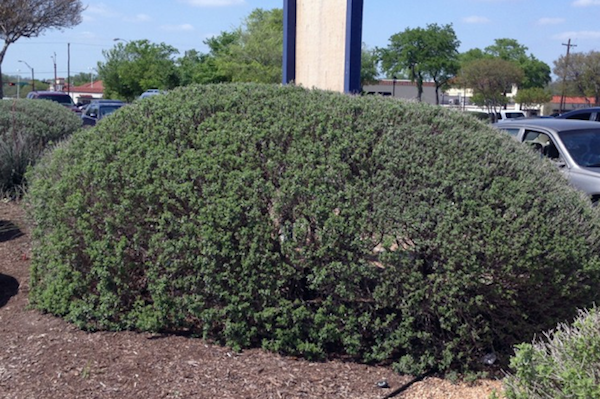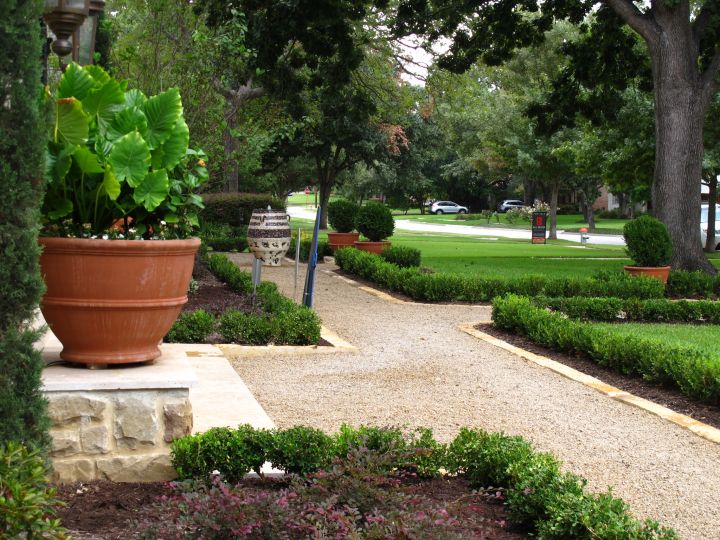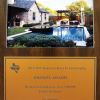Garden Style: Formal Hedges
November 10, 2014 | By webadmin
Some shrubs are meant to be sheared into formal hedges; others are not. Unfortunately, it’s a common sight these days to see shrubs being pruned the wrong way. For example, you’ve probably come across what would be a lovely Knock Out® rose that has been cut into a square hedge, or a Texas sage sheared into what can only be described as a round “caterpillar”.

Does this Texas sage look natural? It should be covered in blooms instead of overly pruned.
This kind of heavy shearing is not only inappropriate for these plant varieties, as it will cause them to thin out over time, but it also causes you to lose out on all the flowers. Why plant a blooming shrub only to continually shear off its blooms? Pruning them in this manner can cause plants to go into decline over time. Shrubs like roses, loropetalum, nandina and Texas sage should be tip pruned by hand to maintain size and good shape, not sheared.

When you’re trying to create a formal hedge, there are plants perfect for the job. Certain plants will respond well to regular shearing and offer up a regular flush of new green growth. If you plan to create a formal hedge, be sure the right plants are selected at the beginning of your design process. Plants with large, stiff leaves often do not make good candidates for sheared hedges because of the damage caused to the foliage.
Take formal hedge to the next level.
We recently created a series of formally hedged parterres for a client (as seen in the photo above). Parterre gardens are very classically styled gardens seen in France beginning in the 16th century. This garden style is achieved by carefully pruning shrubs into even, symmetrical shapes and designs around a central focal point such as a seating area or fountain. Parterre gardens consist of pathways, green borders and well-placed perennials and annuals. Not only are they incredibly beautiful to stroll through, but if you have a second story to your home or an elevated patio, then the view looking down onto these gardens is fabulous as well.
Here are a few favorite shrubs that work beautifully as pruned or sheared hedges, parterres or topiaries:
Boxwood. This is the perfect, quintessential shrub that can be shaped a variety of ways. Plant boxwoods in rows as a border to your garden or parterre. Their abundance of dense, dark green foliage makes them an excellent choice for a structured, formal landscape. Prune them into hedges, balls, boxes, spirals or even animal shapes.
Japanese plum yew (Podocarpus macrophyllus). While plants can be tricky to get established the first few years, once they’ve adequately rooted in they can be good drought tolerant hedges. Their terminal leaf buds allow you to prune and shape them into a formal evergreen hedge.
Common Myrtle (Myrtus communis) is a bushy medium-sized evergreen shrub with small fragrant leaves and profuse tiny white blooms. Also called sweet myrtle, there is a dwarf selection that grows to only 4-feet tall. Plants can be sheared and shaped as needed to create a small formal hedge or parterre.
Juniper. While you don’t want to shear them too often, Junipers make excellent topiary specimens that can be shaped into pyramids, spirals and pom pom standards.
Elaeagnus. These are tough, fast growing evergreens for water-wise landscapes. Plants have silver-green foliage and can be shaped into formal hedges. Elaeagnus typically grows to about 8-feet tall, but can be pruned to your desired size. Compact forms are also available.
Pittosporum. Because of their fast growth rate, many species of Pittosporum can make good candidates for formal hedges. Plants are available in solid green and variegated selections. Plants will need to be pruned regularly to keep their density and shape.
Other plants that can be sheared for a more formal look include holly, arborvitae and cherry laurel.
Looking for more formal gardens inspiration? Peruse through our Pinterest Board on the topic. Now would be the perfect time to design, plant and prune your dream landscape! Contact us here.
